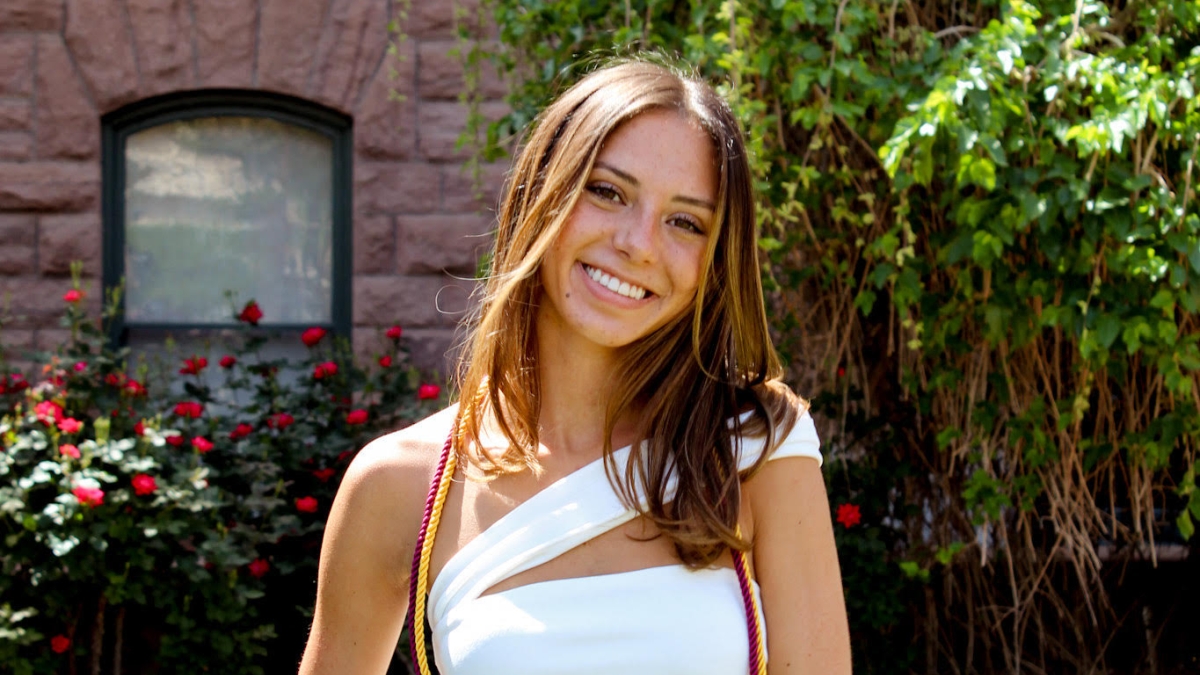Editor's note: This story is part of a series of profiles of notable spring 2022 graduates.
Graduating this May from Arizona State University with a double major in communications and political science, Maggie Sullivan plans to combine both degrees in order to succeed in her future endeavors as a politician.
After gaining a strong interest in the coursework, Sullivan decided to add political science as a major on top of communications as it allowed her to better understand how mass media affects public policy.
Sullivan knew she made the right decision coming to ASU as she sat in a lecture hall for a political science course during her second semester.
“I was sitting next to four friends I had made in the class and the entire class was having a healthy debate over a controversial topic in Arizona politics,” Sullivan said.
“It was an amazing feeling when I realized how diverse my university was and how intellectual my classmates were. Arizona State University provided courses that allowed me to understand many different viewpoints and cultivate relationships with intellectual people,” she said.
Alongside her education, Sullivan completed several hands-on experiences during her time at ASU that will help prepare her for the professional workplace.
Sullivan had the opportunity to work as a Senate Page during the 2020 and 2021 Arizona legislative sessions. This role allowed her to get involved with the Arizona State Capitol where she assisted members, staff and the public in all aspects of the legislative process.
It was during this opportunity that Sullivan gained a leadership position as the Office Liaison for the Senate Page Program and became responsible for the Request to Speak system for every Senate committee. Here, she delegated 15 interns regarding all processes required to serve the Senate.
“In this position, I benefited so much from my supervisor, Jenna Lyon, who became a mentor to me. Jenna aided me in discovering my passion for politics and how to work in a professional environment,” Sullivan said.
Sullivan had the chance to return to the Arizona State Senate during the 2022 legislative session as a research intern for the Education Committee. She shared that she has tremendously grown during this process and it has shown her that she has a very strong interest in public policy.
“As a research intern, I presented bills in committee, drafted legislation and official documents, and networked with Senators, staff and stakeholders. This internship has prepared me to exceed since I have obtained incredible professional skills, writing and researching skills, and I have created relationships that will help me further my career,” Sullivan said.
Sullivan gives credit to the School of Politics and Global Studies for her successes in her education and access to professional opportunities. She believes the school helped pave the way for her to get involved in Arizona politics and only strengthened her desire to study public policy.
With a Bachelor of Arts in communications and political science, Sullivan will be graduating summa cum laude and is a recipient of the Moeur Award, given to undergraduates with the highest academic standing in their college, for The College of Liberal Arts and Sciences.
Sullivan says she is lucky to have spent the past three years as a Sun Devil and is thrilled to continue her career in public policy and eventually attend law school.
Question: What is a lesson you can take away from your time spent at ASU?
Answer: A lesson that I can take away from my time spent at Arizona State University is to always get involved whenever you can! I jumped at every opportunity and joined classes that I seemed interested in. A college experience is meant to allow you to try new things and branch out of your comfort zone. If you told me three years ago that I would meet friends that would become family, make memories that would last a lifetime, and work at the Arizona State Senate, I would be shocked! All of my amazing experiences that happened at Arizona State University are due to my willingness to try new things!
Q: What advice would you give to those who are coming to ASU in the fall?
A: Try anything and everything! You are only at Arizona State University for four years and you must make the most of every opportunity. Go up to that random person in the dining hall, take that class you never thought you would have time for, attend those events, apply for the internship and try everything!
More Law, journalism and politics
Can elections results be counted quickly yet reliably?
Election results that are released as quickly as the public demands but are reliable enough to earn wide acceptance may not…
Spring break trip to Hawaiʻi provides insight into Indigenous law
A group of Arizona State University law students spent a week in Hawaiʻi for spring break. And while they did take in some of the…

LA journalists and officials gather to connect and salute fire coverage
Recognition of Los Angeles-area media coverage of the region’s January wildfires was the primary message as hundreds gathered at…


